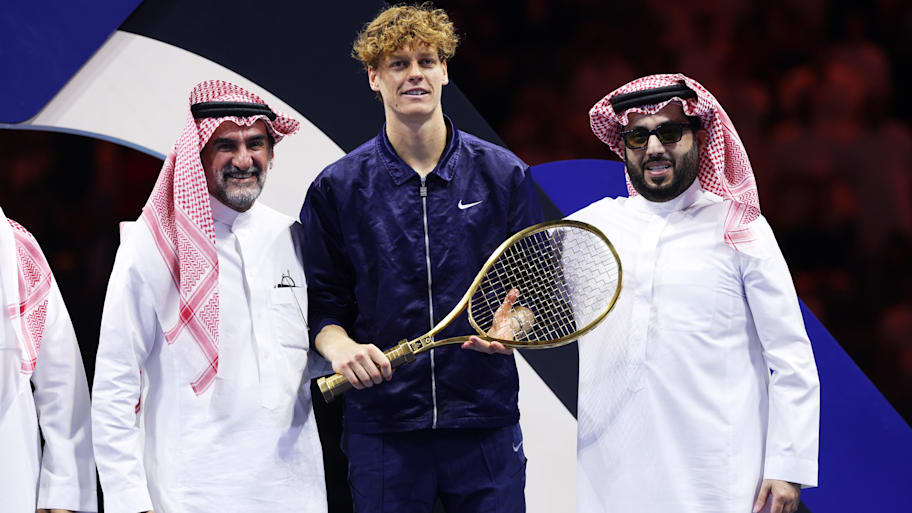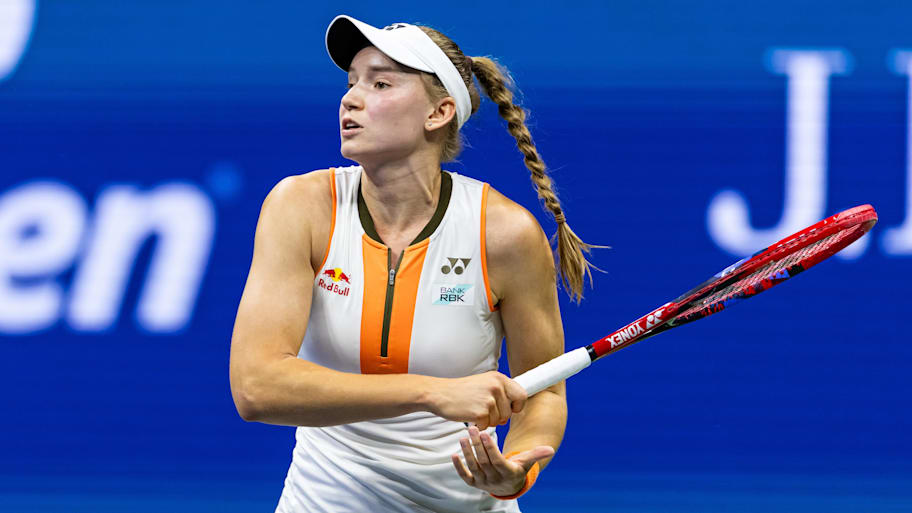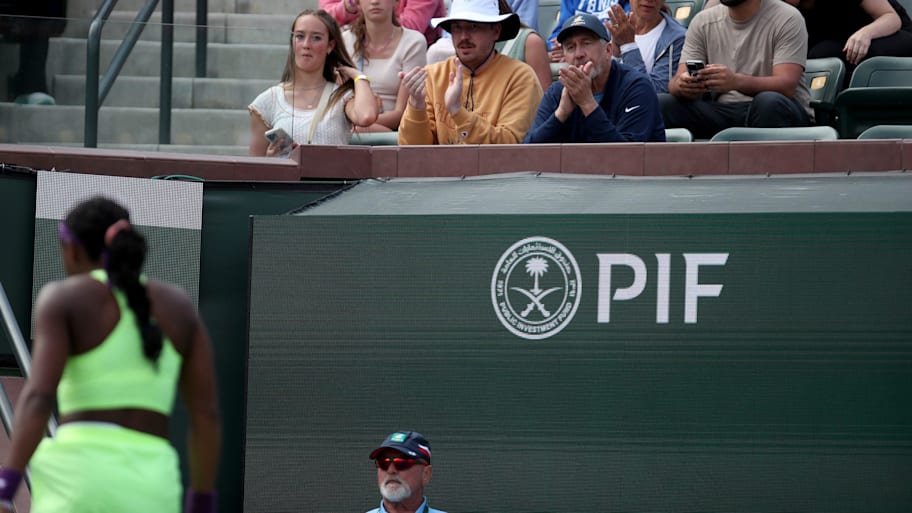Hey everyone …
• Here’s the latest Served podcast:
• How does Shohei Otani’s postseason feat stack up against the tennis greats? We weigh in.
• Unsolicited for the NYC crowd, note the centennial concert at Lincoln Center next week.
• The WTA announced the appointment of Valerie Camillo as its new chair, charged with leading the next phase of growth for women’s professional tennis. Camillo will begin her role on Nov. 17.
Onward …
I listened to the emergency Served. The floor of my car has a dent in it from my jar dropping on the news of the Saudi 1000. If there was ever proof that the schedule will never, ever see the wholesale change AR’s talked about it’s this. (Unless, Sistine Chapel-like, the Lord touches tennis and creates a living Commissioner of Tennis. I ain't holding my breath.)
Skip Schwarzman
• Here is the emergency podcast episode on the new Masters 1000 in Saudi Arabia. This news was the biggest source of mailbag chatter this week. Here are 10 points without mentioning the word sportswashing:
1) The top players have been relentless and consistent in their cries that the season is too long, too taxing and there are too many mandatory events. As players take to social media—from a hospital bed in one case—the ATP has been strikingly and disappointingly silent. Then, a few days later, we get the gushing press release about a 10th Masters 1000 event? Tennis, baby.
2) Props to the Saudis here. LIV Golf was—and is—a disaster, a hostile takeover attempt that went sideways and damaged a sport (and various reputations) along the way. Lesson learned, the Saudi foray into tennis was much smoother, gentler and strategic. Saudi Arabia held some exhibitions, landed the WTA Finals, sponsored the rankings, got the blessing of folks like Rafael Nadal and Billie Jean King, and, with minimal fanfare or controversy, here we are.
3) Oddly, this splashy announcement neglected to mention where in the tennis calendar this event would fall. Not exactly a minor detail. (February is the obvious place, though there is speculation it could begin in late December before the Australian swing.) It also mentioned 2028 as the start, but I keep hearing 2027.
4) Included in this Saudi windfall? Money for the ATP buyback pool. What does this mean? The ATP can (must?) start buying out events and decluttering the calendar. This windfall also includes the equivalent of an expansion fee, a distribution to the other events for allowing the new guy into the club.
5) Assuming this event slides into February, it’s bad news for the South American events. Which is a pity because these are some of the most spirited, enthusiastically attended and vibrant tournaments. And there is a future star who could singlehandedly prop them up. (He just won Basel.)
6) The ATP held open bidding for this 10th Masters event. But imagine you’re Qatar—not exactly a country strapped for cash—and you’ve been a loyal, sanction-paying ATP citizen for decades. And your rival country essentially jumps the line?
7) What do we make of the fact that this splashy announcement was not made in conjunction with Six Kings? You have Carlos Alcaraz and Jannik Sinner in Riyadh 72 hours before this broke. Wouldn’t you want them as part of the rollout?

8) Technically, as a Masters 1000 that is not mandatory, this Saudi event can pay appearance fees. If players are getting seven-figure payouts for a low-energy, three-day exhibition, imagine the fees that stars can—and will—command for a Masters 1000.
And, where are the women? Again and again, we hear whispers about this joint WTA-ATP venture finally happening. Again and again we hear—and agree—that tennis events are best when men and women are together. Again and again, we hear that Saudi Arabia really wants to send a message that it values men and women equally. Wouldn’t this have been an ideal time and place for a joint event?
9) Sportswashing adjacent: It bears repeating that traditional sports economics don’t matter here. This is not the usual calculus: i.e., making more in media rights, tickets, suites, sponsors and merch (and now gambling revenues) than you disburse in salary and prize money. This is about a government-sponsored rebrand of an entire country. On a balance sheet, this makes no sense. Do the back-of-the-napkin math on the Six Kings Slam, and it could easily have lost five times what it earned. It doesn’t matter.
10) For all the complaints and concerns, let’s take a glass-half-full view. Like most workforces, tennis players want more money. Getting Saudi Arabia into the tennis fold is in service of that. Men’s tennis could use a big-ticket event after the buzz of Australia and before the buzz of Indian Wells. If the buyback fund thins the herd of tournaments, it looks less galling to add a 109th Masters 1000.
O.K., I lied. One sportswashing point: I try to strike a balance between naive and cynical; vigilance while keeping an open mind. It’s easy to see how investing in sports (and comedy and music fests) can launder a reputation, put concealer over human rights abuses and normalize an autocracy. But it’s also easy to see how—if you’re trying to diversify an economy, retain your younger population, show the world you’re a tolerant, modernized, fun-loving society and demystify what is mysterious to many—investing in the soft power of sports makes sense.
In this case, Saudi Arabia is indisputably moving in a progressive direction. But it still is only a few years from the killing of a journalist, a murder that, per U.S. intelligence, was done with knowledge (or at the behest of) its leader. It still criminalizes homosexuality. It still ranks near the bottom among countries in terms of women’s rights.
Saudi Arabia has little tennis history to speak of. There is currently no Saudi player in the ATP’s top 1000. Yet this country throws millions of dollars at players who play before crowds comparable to those at a college dual match. Its sovereign wealth fund sponsors the rankings. It recruits former players as “ambassadors.” Now there’s probably … what? .... a half billion dollars being thrown at a nonmandatory event?
This could be a great jackpot for tennis. This could give rise to a host of male and female stars from a new market. This could open eyes and doors. This could be a bonanza for tennis. This could be tennis helping a country modernize and improve its human rights record.
But it would be nice if there were some acknowledgement— by sports bodies and Saudi Arabia—of how unusual and extraordinary this is. What a significant departure from norms (social, economic, cultural) this is. What a foundational change this could be for tennis. What a risk this carries.
This is not adding a week between Wimbledon and Roland Garros, a new mixed doubles format or adding a few days to the Masters 1000.
We’ll see what happens. Let’s hope, sincerely, that it works out.
• There was also a lot of chatter about the NBA gambling scandal. Let’s push a bit to next week, as there are so many angles to this, but here are some preliminary thoughts:
1) Prop bets change everything. They change the risk-reward ratio for those considering committing bad acts, alter the level of coordination and collusion needed to tank and shift the calculus for leagues. (They also undermine the league’s justification for endorsing gambling. It’s going to happen anyway; we may as well have the sunlight of gambling companies flagging erratic betting patterns. Wrong. You always had neighborhood bookies. You never had them offering action on whether a player will have fewer than three assists or miss a second serve.)
2) Any sport where one athlete can corrupt or manipulate honest competition without involving teammates is going to be vulnerable. It’s hard for a running back to go rogue. It’s not hard for a basketball player (or tennis player) to deviate.
3) This is often framed as greed. He makes $9 million a year. Why would he risk it all? Too often, we overlook duress, or what organized entities would do if Player X didn’t cooperate and play ball.
Simple question: Is Elena Rybakina going to win another major? I hope so!
Katie B.
• Simple answer, sure! I wouldn’t guarantee it. But I definitely wouldn’t rule it out either. Larger point: If you are in this futurology game—and most of us, reluctantly, are—why categorically rule anything out? A qualifier will never win a major! Emma Raducanu would like a word with you. Roger Federer is cooked! Nadal is done! Novak Djokovic has been deposed. (Each won a major north of age 35.) We will never see another teenager win a major! Enter Coco Gauff. Predictions are all well and good, but certitude seems silly. In this case, Rybakina—a major champ at Wimbledon, runner-up in Australia, and a great player still in her mid-20s, who appears to be trending in the right direction—could win another. She could not. But it seems equally foolish, mean-spirited and attention-seeking to declare, flatly, that she won’t.

Jon, what is going on at the USTA? Weren’t they supposed to have a new chief executive by now?
Dave K.
• An ironclad rule: These searches take longer than first anticipated. When any business says, We hope to fill the role and announce a successor by Date X, add a few months. With respect to the USTA, the idea that the chief executive would announce his resignation Memorial Day weekend and—while preparing to stage the tournament—a new boss would be named before the end of the tournament? It was always a dubious timeline. Here we are in late October, and I am told there is no internal candidate, three outside candidates, and that the announcement ideally comes before the end of the year.
Glass half-full: It speaks well of the USTA, the existing leadership and the processes in place that you can lose your chief during Roland Garros and still put on a smashingly successful, record-attended and record-revenue U.S. Open.
This is often a dilemma tennis faces. The knee-jerk response is to bring in an outside candidate. We need fresh thinking! Someone to shake this up! Someone from F1. Or the NBA. As was nearly the case when the ATP needed a CEO—someone from the NFL. But tennis is peculiar in that it requires a fundamental familiarity with its governance, tour structure, the role of the majors, etc. I’ve heard stories of new executives going into meetings, confusing, say, the dates of Indian Wells and Miami or not knowing that Davis Cup doesn’t confer ranking points. These are understandable I’m-learning-as-I-go questions. But you lose the room when you’re surrounded by tennis lifers and lack the accumulated knowledge.
A corollary: Executives come from the outside and are accustomed to a certain structure, governance and metabolism. They realize tennis’s quirks and limitations. What do you mean we can’t just switch the dates of tournaments? What do you mean IMG owns events and has a tournament board rep AND represents players and has a player board rep? What do you mean the majors have an equity in the Laver Cup? They get easily frustrated and leave.
Saw the Hall of Fame nominees come out. Seems odd that Daniel Nestor is not in the Hall yet, nor even up for it this year. What gives?
Alex, Thunder Bay
• Elbows Up! Yeah, I’m with you. Speaking only for myself, I would—and did—vote for Daniel Nestor without hesitation. He has more than 1,000 wins, 91 titles and is maxed out on good-guy points. He achieved the No.1 ranking, won eight doubles majors, four mixed doubles majors and Olympic gold. (For good measure, Nestor has a singles win over Stefan Edberg.) After the Bryan brothers, it’s hard to conceive of a more worthy doubles candidate.
Shots
• World No. 5 and 2025 Charleston champion Jessica Pegula will return to the Charleston Open to defend her title, beginning March 28.
More Tennis on Sports Illustrated
This article was originally published on www.si.com as Tennis Mailbag: How New Saudi Arabia Masters 1000 Event Could Shake Up the Sport.

